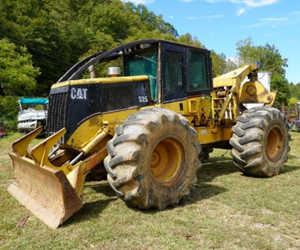Voices of 2019: TH Looks Back
Article by Dan Shell, Managing Editor, Timber Harvesting January/February 2020
 EDITOR’S NOTE: As we look ahead to 2020 it sometimes helps to look back at what we heard in 2019 and the voices of our industry.
EDITOR’S NOTE: As we look ahead to 2020 it sometimes helps to look back at what we heard in 2019 and the voices of our industry.
“We manage very much as a team, and try to cover for each other’s weaknesses while playing to our strengths. Once you get all the pieces together, it’s amazing how strong you can be.”—Lee Miller, owner of Logging Business of the Year Miller Timber Services, Philomath, Ore.
“A lot of times the ex-military guys tend to be more organized, and I realized guys like that don’t come around very often. I may be a dummy about some things, but I’m smart enough to surround myself with smart people—and we have a lot of good people.”—Jeff Wyss, Wyss Logging, Yakama, Wash., on hiring superintendent Brad Slyter and other employees.
“You have newer contractors who will work longer days for less with the mills baiting these young guys along, telling them ‘If you buy this equipment, it will get you more work.’ But what they get is more debt, then have to (accept) working cheaper to keep the bills paid.”—Tim Christopherson, Kamiah, Id.
“I believe the return on investment is very far from being fair to loggers. The mills are very inconsistent. Cut and haul rates are definitely not responding to other costs. The resource we harvest is renewable, but the people doing the work aren’t.”—Will Chapman, Newberry, SC
“To get top notch workers, the pay scale must rise dramatically, especially for the employees that work on the ground. Our biggest issue in the West is finding qualified help.”—Bruce Zuber, Zuber Logging, Gold Beach, Ore.
“The appeal to me was I could do cable logging ground with ground-based machinery.”—Oregon logger Don Meng on tethering operations and blending tethering and shovel logging applications.
“Money may not grow on trees, but the solution to climate change does. It’s time for Americans to embrace clean, sustainable biomass.”—Enviva CEO John Keppler
“You need to work as hard as you’ve ever worked and never let down because it’s always going to get tougher. Don’t get too big too quick and take your time with each equipment purchase.”—Chris Jordan, age 28, Chris Jordan Hauling, Mt. Gilead, NC, on young loggers starting out.
“The root of Maine’s vital forest products economy—the logging industry—must be able to offer wages to compete for existing workers and attract new ones.”—Dana Doran, Executive Dir., Professional Logging Contractors of Maine
“You always have a plan when you start a job, but by the end you may be on plan C or D. Our philosophy is to encourage our employees to be leaders, not followers, and take the initiative.”—Wyss Logging Superintendent Brad Slyter
“The manager’s attitude toward safety and health shows in every decision made and action taken. Employees respond to that attitude. Management demonstrates commitment, or lack of it, by the priority placed on related issues.”—safety consultant Dan Krusze
“There’s a lot of good kids out there and we need to have faith in them and give them the tools they need. It’s critical that our industry reach out to young people and important for (my) generation of leaders to foster young folks to lead this industry in the future.”—Matthew Mattioda, Vice President CTL Systems-Chief Forester, Miller Timber Services.
“If you’ve got the right employees you’re not worried about tracking them. But I can see little things, like how many hours a machine worked and how long it idled.”—Dean Gordon, Dean Gordon Trucking, Edson, Alberta, on using machine data reports.
“Our schedule is very unpredictable, so I never have my operator tethering by himself. I always have another operator there.”—Andy Postlewait, Northwest Timber Cutting, Deming, Wash.
“If loggers can stick together and form the cooperative the bill refers to, then this could be a game changer for the current procurement system that has stymied loggers for decades.”—American Loggers Council Exec. Dir. Danny Dructor on Maine’s recent legislation allowing loggers to collectively bargain.
“Loggers, dealers, paper companies and sawmills are going to have to recognize that the workforce needs to be developed, and the industry is going to have to step up.”—Ray Clifton, director of training, Alabama Forestry Assn. Forest Workforce Training Institute.
Latest News
Sponsored Content Provided By BARKO
Bright Star Auctions is excited to announce our Fall Appalachian Consignment Auction in Elkin, NC. The auction will be held on November 18 at 9 AM at Pirate’s Landing Restaurant. The Equipment yard is located right beside the restaurant at 260 Elkin Wildlife Rd, Elkin NC…
Idaho Health Group Plan Keeps Growing
Idaho Health Group Plan Keeps GrowingA note in the March-April Idaho Logger publication of the Associated Logging Contractors-Idaho loggers association says the group’s health plan that...
WANT MORE CONTENT?
Spanning seven decades since its inception in 1952, Timber Harvesting highlights innovative and successful logging operations across the U.S. and around the world. Timber Harvesting also emphasizes new technology and provides the best marketing vehicle for the industry’s suppliers to reach the largest number of loggers in North America and beyond.
Call Us: 800.669.5613

